#worldcon
Text
Chinese Censorship of the 2023 Hugo Award Nominations
Back before the 2023 Hugo Nominations were conducted, I noted that the Chengdu Worldcon Hugo committee had inserted a worrying clause indicating that local government officials could invalidate nominations for breaching the norms and standards of China. I suspected this would result in arbitrarily applied censorship to control the ballot. I am sad and unsurprised to discover I was correct.
The 2023 Hugo Nomination vote data has been published (https://www.thehugoawards.org/2024/01/2023-nominating-and-final-ballot-statistics-published/), and includes notation where nominations were excluded from the ballot. Those with normal reasons, such as being in the wrong category or not being published in 2022 are identified with their reasons for exclusion. This time there are a number of nominations that are merely marked at "Not eligible".
Here is the list of those nominations, that would otherwise have been placed on the final 2023 Hugo Award Ballot.
Babel - R.F. Kuang - Best Novel: Very likely excluded for referencing student revolution, and the use of language and translation as coercive tools of oppression.
Color the World - Congyun "Mu Ming" Hu - Best Novellette : A story about perception of, aid of, and discrimination against disability. Congyun Hu has left China and now lives in New York.
Fogong Temple Padoga - Hai Ya - Best Story : Either there is something in the original Chinese that was not translated, there's a taboo subject that elides my reading, or this otherwise innocent looking near future tale of cultural building restoration was written by the wrong person.
The Art of Ghost of Tsushima: Dark Horse and Sucker Punch Games - Best Related Work : The video game Ghost of Tsushima was subject to directed social exclusion for it's depiction of the Mongol invasion of Japan.
Sandman, Amazon Studios: Best Dramatic Presentation (Long and Short) - A diverse and divergent cast, includes subject matter and social issues that are currently taboo in China.
Paul Weimer - Fan Writer: Publicly Critical of holding a Worldcon in China.
Xiran Jay Zhao - Astounding Award: Qualifying work "Iron Widow" is reimagined story of Chinese Empress Wu during a fantasy/mechanical alien invasion.
This raises a lot of questions as to if this basically taints the process, and what can be done about it.
#hugo awards#babel#r.f. kuang#color the world#mu ming#congyun hu#fogon temple padoga#hai ya#Ghost of Tshuima#Sandman#neil gaiman#paul weimer#xiran jay zhao#iron widdow#censorship#china#chengdu 2023#worldcon
5K notes
·
View notes
Text
The majority of censorship is self-censorship

I'm on tour with my new novel The Bezzle! Catch me TONIGHT in SAN DIEGO (Feb 22, Mysterious Galaxy). After that, it's LA (Saturday night, with Adam Conover), Seattle (Monday, with Neal Stephenson), then Portland, Phoenix and more!

I know a lot of polymaths, but Ada Palmer takes the cake: brilliant science fiction writer, brilliant historian, brilliant librettist, brilliant singer, and then some:
https://pluralistic.net/2022/02/10/monopoly-begets-monopoly/#terra-ignota
Palmer is a friend and a colleague. In 2018, she, Adrian Johns and I collaborated on "Censorship, Information Control, & Information Revolutions from Printing Press to Internet," a series of grad seminars at the U Chicago History department (where Ada is a tenured prof, specializing in the Inquisition and Renaissance forbidden knowledge):
https://ifk.uchicago.edu/research/faculty-fellow-projects/censorship-information-control-information-revolutions-from-printing-press/
The project had its origins in a party game that Ada and I used to play at SF conventions: Ada would describe a way that the Inquisitions' censors attacked the printing press, and I'd find an extremely parallel maneuver from governments, the entertainment industry or other entities from the much more recent history of internet censorship battles.
With the seminars, we took it to the next level. Each 3h long session featured a roster of speakers from many disciplines, explaining everything from how encryption works to how white nationalists who were radicalized in Vietnam formed an armored-car robbery gang to finance modems and Apple ][+s to link up neo-Nazis across the USA.
We borrowed the structure of these sessions from science fiction conventions, home to a very specific kind of panel that doesn't always work, but when it does, it's fantastic. It was a natural choice: after all, Ada and I know each other through science fiction.
Even if you're not an sf person, you've probably heard of the Hugo Awards, the most prestigious awards in the field, voted on each year by attendees of the annual World Science Fiction Convention (Worldcon). And even if you're not an sf fan, you might have heard about a scandal involving the Hugo Awards, which were held last year in China, a first:
https://www.nbcnews.com/news/world/science-fiction-authors-excluded-hugo-awards-china-rcna139134
A little background: each year's Worldcon is run by a committee of volunteers. These volunteers put together bids to host the Worldcon, and canvass Worldcon attendees to vote in favor of their bid. For many years, a group of Chinese fans attempted to field a successful bid to host a Worldcon, and, eventually, they won.
At the time, there were many concerns: about traveling to a country with a poor human rights record and a reputation for censorship, and about the logistics of customary Worldcon attendees getting visas. During this debate, many international fans pointed to the poor human rights record in the USA (which has hosted the vast majority of Worldcons since their inception), and the absolute ghastly rigmarole the US government subjects many foreign visitors to when they seek visas to come to the US for conventions.
Whatever side of this debate you came down on, it couldn't be denied that the Chinese Worldcon rang a lot of alarm-bells. Communications were spotty, and then the con was unceremoniously rescheduled for months after the original scheduled date, without any good explanation. Rumors swirled of Chinese petty officials muscling their way into the con's administration.
But the real alarm bells started clanging after the Hugo Award ceremony. Normally, after the Hugos are given out, attendees are given paper handouts tallying the nominations and votes, and those numbers are also simultaneously published online. Technically, the Hugo committee has a grace period of some weeks before this data must be published, but at every Worldcon I've attended over the past 30+ years, I left the Hugos with a data-sheet in my hand.
Then, in early December, at the very last moment, the Hugo committee released its data – and all hell broke loose. Numerous, acclaimed works had been unilaterally "disqualified" from the ballot. Many of these were written by writers from the Chinese diaspora, but some works – like an episode of Neil Gaiman's Sandman – were seemingly unconnected to any national considerations.
Readers and writers erupted in outrage, demanding to know what had happened. The Hugo administrators – Americans and Canadians who'd volunteered in those roles for many years and were widely viewed as being members in good standing of the community – were either silent or responded with rude and insulting remarks. One thing they didn't do was explain themselves.
The absence of facts left a void that rumors and speculation rushed in to fill. Stories of Chinese official censorship swirled online, and along with them, a kind of I-told-you-so: China should never have been home to a Worldcon, the country's authoritarian national politics are fundamentally incompatible with a literary festival.
As the outrage mounted and the scandal breached from the confines of science fiction fans and writers to the wider world, more details kept emerging. A damning set of internal leaks revealed that it was those long-serving American and Canadian volunteers who decided to censor the ballot. They did so out of a vague sense that the Chinese state would visit some unspecified sanction on the con if politically unpalatable works appeared on the Hugo ballot. Incredibly, they even compiled clumsy dossiers on nominees, disqualifying one nominee out of a mistaken belief that he had once visited Tibet (it was actually Nepal).
There's no evidence that the Chinese state asked these people to do this. Likewise, it wasn't pressure from the Chinese state that caused them to throw out hundreds of ballots cast by Chinese fans, whom they believed were voting for a "slate" of works (it's not clear if this is the case, but slate voting is permitted under Hugo rules).
All this has raised many questions about the future of the Hugo Awards, and the status of the awards that were given in China. There's widespread concern that Chinese fans involved with the con may face state retaliation due to the negative press that these shenanigans stirred up.
But there's also a lot of questions about censorship, and the nature of both state and private censorship, and the relationship between the two. These are questions that Ada is extremely well-poised to answer; indeed, they're the subject of her book-in-progress, entitled Why We Censor: from the Inquisition to the Internet.
In a magisterial essay for Reactor, Palmer stakes out her central thesis: "The majority of censorship is self-censorship, but the majority of self-censorship is intentionally cultivated by an outside power":
https://reactormag.com/tools-for-thinking-about-censorship/
States – even very powerful states – that wish to censor lack the resources to accomplish totalizing censorship of the sort depicted in Nineteen Eighty-Four. They can't go from house to house, searching every nook and cranny for copies of forbidden literature. The only way to kill an idea is to stop people from expressing it in the first place. Convincing people to censor themselves is, "dollar for dollar and man-hour for man-hour, much cheaper and more impactful than anything else a censorious regime can do."
Ada invokes examples modern and ancient, including from her own area of specialty, the Inquisition and its treatment of Gailileo. The Inquistions didn't set out to silence Galileo. If that had been its objective, it could have just assassinated him. This was cheap, easy and reliable! Instead, the Inquisition persecuted Galileo, in a very high-profile manner, making him and his ideas far more famous.
But this isn't some early example of Inquisitorial Streisand Effect. The point of persecuting Galileo was to convince Descartes to self-censor, which he did. He took his manuscript back from the publisher and cut the sections the Inquisition was likely to find offensive. It wasn't just Descartes: "thousands of other major thinkers of the time wrote differently, spoke differently, chose different projects, and passed different ideas on to the next century because they self-censored after the Galileo trial."
This is direct self-censorship, where people are frightened into silencing themselves. But there's another form of censorship, which Ada calls "middlemen censorship." That's when someone other than the government censors a work because they fear what the government would do if they didn't. Think of Scholastic's cowardly decision to pull inclusive, LGBTQ books out of its book fair selections even though no one had ordered them to do so:
https://www.nytimes.com/2023/05/06/books/scholastic-book-racism-maggie-tokuda-hall.html
This is a form of censorship outsourcing, and it "multiplies the manpower of a censorship system by the number of individuals within its power." The censoring body doesn't need to hire people to search everyone's houses for offensive books – it can frighten editors, publishers, distributors, booksellers and librarians into suppressing the books in the first place.
This outsourcing blurs the line between state and private surveillance. Think about comics. After a series of high-profile Congressional hearings about the supposed danger of comics to impressionable young minds, the comics industry undertook a regime of self-censorship, through which the private Comics Code Authority would vet comings for "dangerous" content before allowing its seal of approval to appear on the comics' covers. Distributors and retailers refused to carry books without a CCA stamp, so publishers refused to publish books unless they could get a CCA stamp.
The CCA was unaccountable, capricious – and racist. By the 60s and 70s, it became clear that comic about Black characters were subjected to much tighter scrutiny than comics featuring white heroes. The CCA would reject "a drop of sweat on the forehead of a Black astronaut as 'too graphic' since it 'could be mistaken for blood.'" Every comic that got sent back by the CCA meant long, brutal reworkings by writers and illustrators to get them past the censors.
The US government never censored heroes like Black Panther, but the chain of events that created the CCA "middleman censors" made sure that Black Panther appeared in far fewer comics starring Marvel's most prominent Black character. An analysis of censorship that tries to draw a line between private and public censorship would say that the government played no role in Black Panther's banishment to obscurity – but without Congressional action, Black Panther would never have faced censorship.
This is why attempts to cleanly divide public and private censorship always break down. Many people will tell you that when Twitter or Facebook blocks content they disagree with, that's not censorship, since censorship is government action, and these are private actors. What they mean is that Twitter and Facebook censorship doesn't violate the First Amendment, but it's perfectly possible to infringe on free speech without violating the US Constitution. What's more, if the government fails to prevent monopolization of our speech forums – like social media – and also declines to offer its own public speech forums that are bound to respect the First Amendment, we can end up with government choices that produce an environment in which some ideas are suppressed wherever they might find an audience – all without violating the Constitution:
https://locusmag.com/2020/01/cory-doctorow-inaction-is-a-form-of-action/
The great censorious regimes of the past – the USSR, the Inquisition – left behind vast troves of bureaucratic records, and these records are full of complaints about the censors' lack of resources. They didn't have the manpower, the office space, the money or the power to erase the ideas they were ordered to suppress. As Ada notes, "In the period that Spain’s Inquisition was wildly out of Rome’s control, the Roman Inquisition even printed manuals to guide its Inquisitors on how to bluff their way through pretending they were on top of what Spain was doing!"
Censors have always done – and still do – their work not by wielding power, but by projecting it. Even the most powerful state actors are not powerful enough to truly censor, in the sense of confiscating every work expressing an idea and punishing everyone who creates such a work. Instead, when they rely on self-censorship, both by individuals and by intermediaries. When censors act to block one work and not another, or when they punish one transgressor while another is free to speak, it's tempting to think that they are following some arcane ruleset that defines when enforcement is strict and when it's weak. But the truth is, they censor erratically because they are too weak to censor comprehensively.
Spectacular acts of censorship and punishment are a performance, "to change the way people act and think." Censors "seek out actions that can cause the maximum number of people to notice and feel their presence, with a minimum of expense and manpower."
The censor can only succeed by convincing us to do their work for them. That's why drawing a line between state censorship and private censorship is such a misleading exercise. Censorship is, and always has been, a public-private partnership.

If you'd like an essay-formatted version of this post to read or share, here's a link to it on pluralistic.net, my surveillance-free, ad-free, tracker-free blog:
https://pluralistic.net/2024/02/22/self-censorship/#hugos
#pluralistic#ada palmer#worldcon#hugos#china#science fiction#fanac#publishing#censorship#systems of information control during information revolutions#scholarship
2K notes
·
View notes
Text
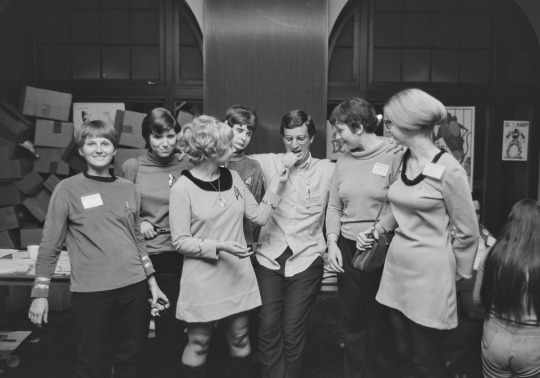
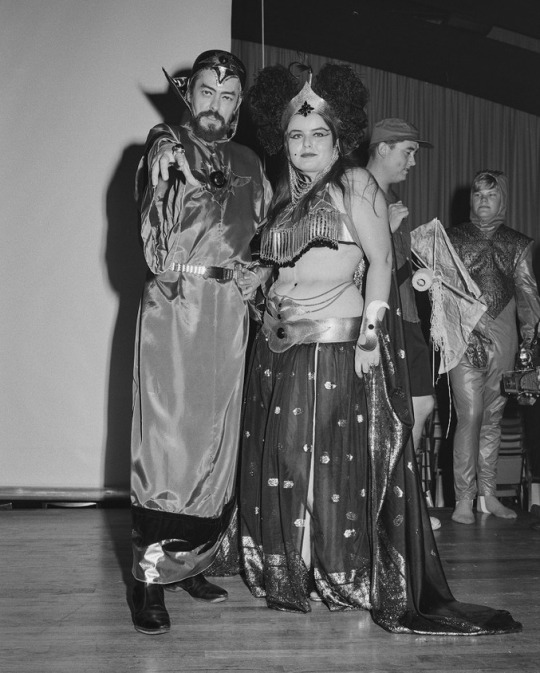
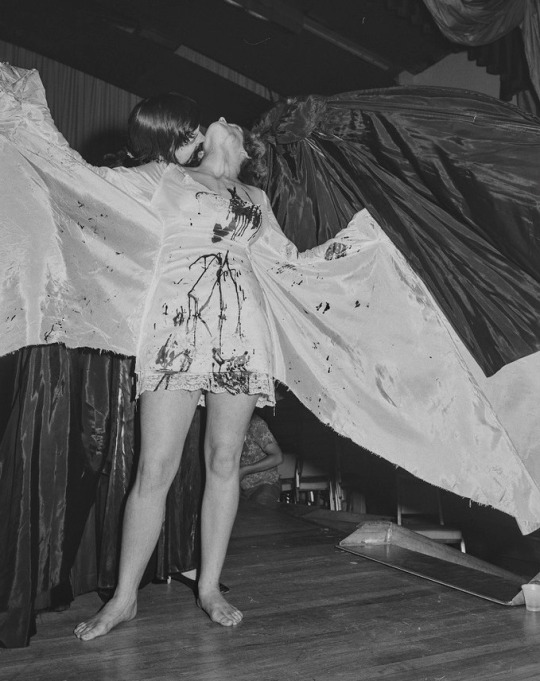
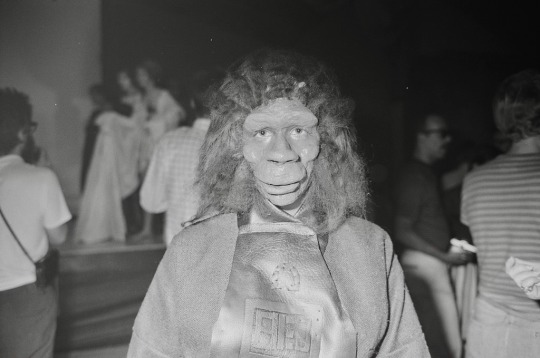
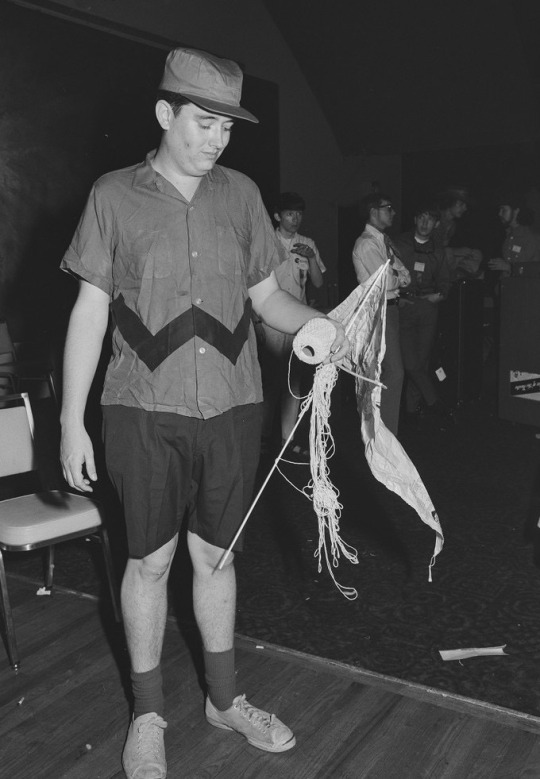
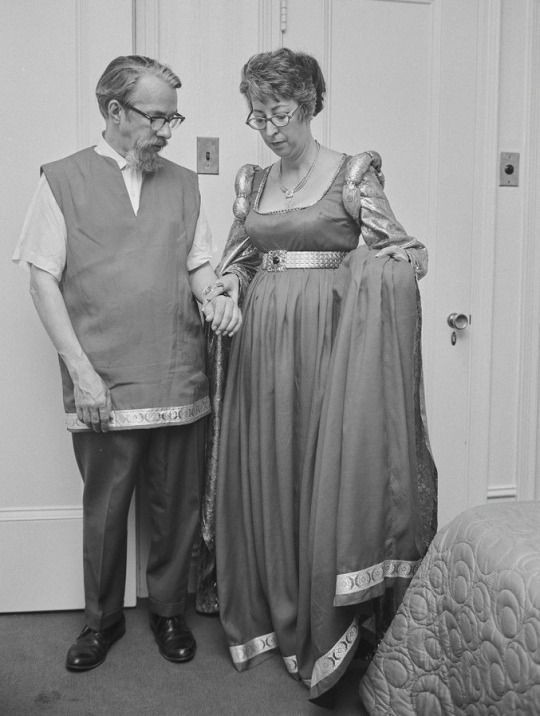
Cosplay at the World Science Fiction Convention in St. Louis, 1969. Photos by Jay Kay Klein.
#cosplay#worldcon#star trek#ming the merciless#flash gordon#charlie brown#lester del rey#planet of the apes
761 notes
·
View notes
Text
From the article:
Esther MacCallum-Stewart, chair of Glasgow Worldcon 2024, has issued an apology on behalf of Worldcon for the acts of censorship that impacted the Hugo, Lodestar, and Astounding Awards at last year's convention in Chengdu. In addition, Kat Jones has resigned as a Hugo Award administrator from Glasgow Worldcon, and has been removed from the Glasgow team across all mediums.
167 notes
·
View notes
Text
We are at the Chengdu Worldcon!
我们来成都世界科幻大会了哦!
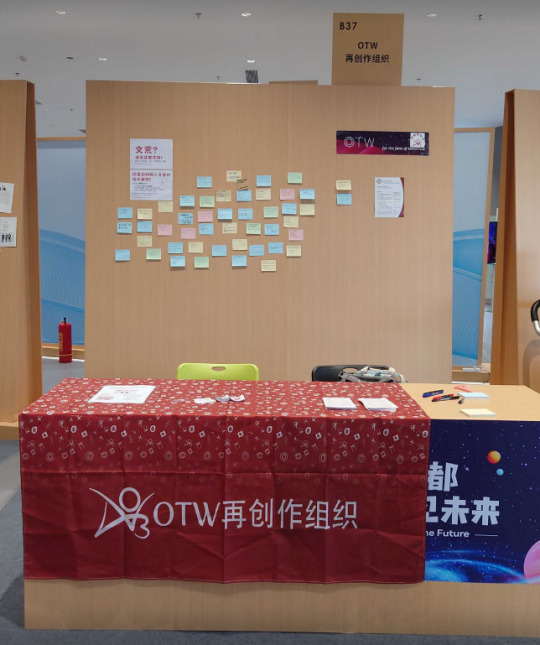
Come visit us at Table B37 to say hi and for stickers! And share your favorite fanfictions with us if you want!
来B37展台找我们打个招呼吧!可以拿贴纸,还可以给我们分享你喜欢的同人文哦!

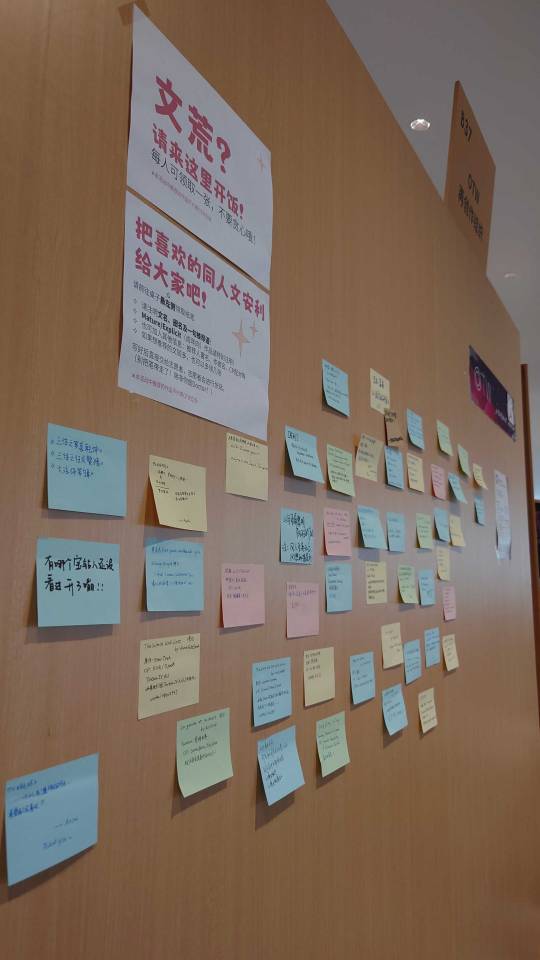
201 notes
·
View notes
Text
leaked emails from last year's hugo awards organizers show they actively tried to single out authors and their submissions from being considered for the awards because of Chinese censorship laws. As in, it wasn't the censors who did it, they just were so scared of running into the law that they essentially did the censor's work for them in anticipation and talked among themselves which candidates shouldn't be nominated.
One notable email singled out author Neseem Jamnia for being "queer, nonbinary, trans" and frequently writing about gender and being nonbinary as being potentially problematic for censorship.
worldcon organizers volunteering information to each other about which of the authors they know are queer so they can disqualify them. stay classy hugos.
#off topic#hugo awards 2023#hugo awards#worldcon#i mean#if i was asked to organize worldcon and i was a hwite living in an anglophone country#i would just.#weaponize that colonizer privilege#let the awards play out??#better to ask forgiveness than permission type of deal?#by the time the CCP was done with investigations i'd be long out of the country type of deal?#what are they gonna do#extradite me?#rip to them but im different
76 notes
·
View notes
Text
sighing deeply, hauling myself out of my chair, picking up the whiteboard eraser, resetting my “years without a major incident at the hugos” board to zero
30 notes
·
View notes
Photo
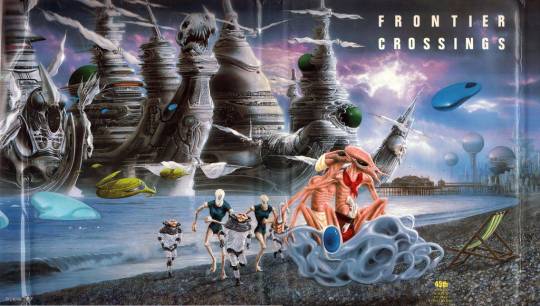
Jim Burns’s 1987 program cover art for Worldcon 45
210 notes
·
View notes
Text
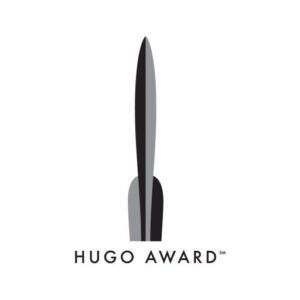
Hugo Award nominations are open for 2024, and TWIFH is eligible in the Best Fancast category! If you are a registered voting member, please consider nominating our little endeavor into fandom history. We know it's a long shot, but we would be deeply honored to be nominated and we hope to continue to grow as a funny and (95%) reliable fannish resource in 2024.
25 notes
·
View notes
Text

The Hugo Award, named after Hugo Gernsback, is the award given out at the World Science Fiction Convention (Worldcon) every year.
The main part of the award is the rocketship, which is manufactured to exacting parameters. Each Worldcon is allowed to customize the award as they see fit, as long as the rocketship is included.
Over the years we've seen an assortment of custom bases, the ship sometime resting on a small planet .
When Japan got their first Worldcon in 2007, they decided to represent its rich tokusatsu history by integrating Ultraman into the award.
40 notes
·
View notes
Text
Further news on the Chengdu 2023 Worldcon Scandal
The more we know, the less honest the Hugo results look. And there's some questions about how the Chendgu 2023 Worldcon was organised.
First of all, the Numbers Don't Add Up. Literally.
Second, it appears that the Chendgu 2023 Worldcon might have been coopted by Chinese Publishing companies. And that their corporate promotion lists might have been used as voting slates. This comes after a game of musical chairs, relocation and alterations from the original winning bid organisation to a new holding company. I have asked Kevin Standlee, chair of the WSFS Marks Protecttion Committee, to clarify what due diligence was taken to protect the Worldcon and Hugo trademarks. (Information via Arthur Lia and other commenters.)
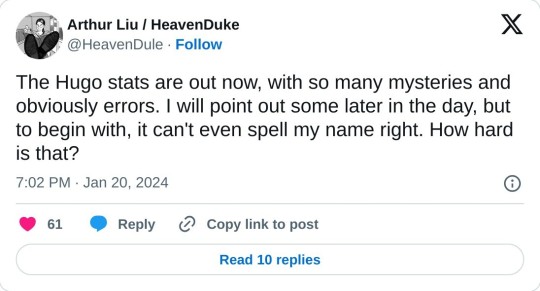

Third, Chinese fandom is also upset over this. Using carefully selected phrasing to express their displeasure at "unspeakable factors". (Via Ersatz Culture at File 770)

Finally Hugo Administrator Dave McCarty categorically declares that the Ballot was conducted properly. He also declines to explain any of the discrepancies, or explain the precise reason for the unexplained disqualifications. He also stated that those who had any further questions "can't understand plain English" and "are slow".

This all strengthens my concerns, and widens them to the possibility that the name of the Hugo Awards and the Worldcon was deliberately coopted by a publishing business group in China. There's the strong possibility that this means that an unfettered licence to the trademarks that protect the Hugo Awards might have slipped into the hands of people willing to abuse them.
I note that Saudi Arabia, Tel Aviv, and Uganda all have bids for future Worldcons.
2K notes
·
View notes
Text
If you're part of the SF/F fandom or have been following the whole Hugo awards nomination debacle from a more popcorn-eating perspective, welp--here's more popcorn, because jiminy christmas what a goddamn ugliness this is.
SUPERBLY unhappy for everyone hurt by this situation, not least the Chinese fans whose safety in fandom is now potentially endangered.
(Also, not best pleased by the persistent misspellings of the Asian authors' names. This is why editors are important. RF Kuang is not SL Huang, and it's Zhao, not Zhou, and the fact that someone In SF didn't catch it over and over again on an important story is not super impressive.)
#hugo awards#chengdu worldcon#SF/F#worldcon#hugos#science fiction and fantasy#science fiction#fantasy#writing
17 notes
·
View notes
Text
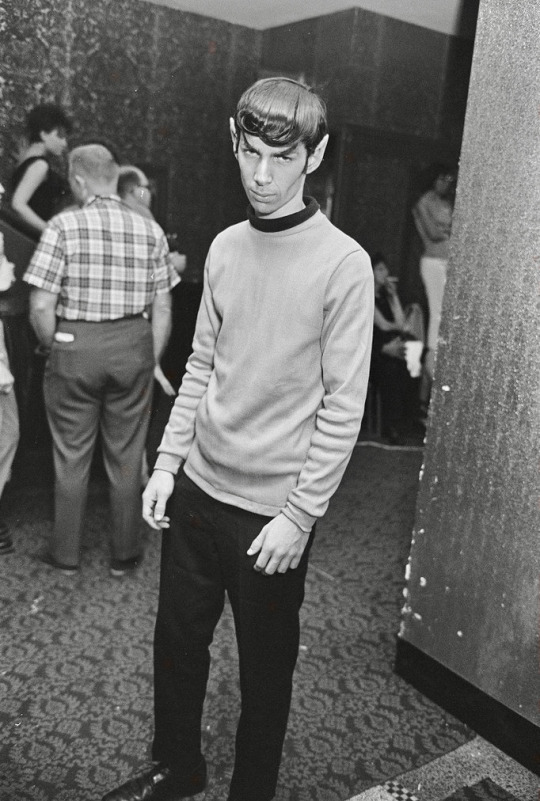
Star Trek cosplay at the World Science Fiction Convention, 1967.
1K notes
·
View notes
Text

I'm sorry to hear of the passing of John Trimble. Before the Trimbles were involved in the SCA, and before Star Trek was even dreamed of, there was Bjo's project to create art shows at science fiction conventions. Here's the late John Trimble sitting at the table of the Chicon III art show in 1962. The fellow standing in the white shirt near the center of the photo is my father Stephen Schultheis, also attending Chicon III. Photo courtesy of the Jay Kay Klein collection at UC Riverside.
8 notes
·
View notes
Text
With all due respect, if I had to choose between walking past a tiger wearing a beef shirt or doing something fucking stupid enough to get Weibo's attention, pass me the ketchup.
8 notes
·
View notes
Text
Babel by R. F. Kuang not only deserves to be on the Hugo ballot, it deserves to win. Fuck censorship.
8 notes
·
View notes